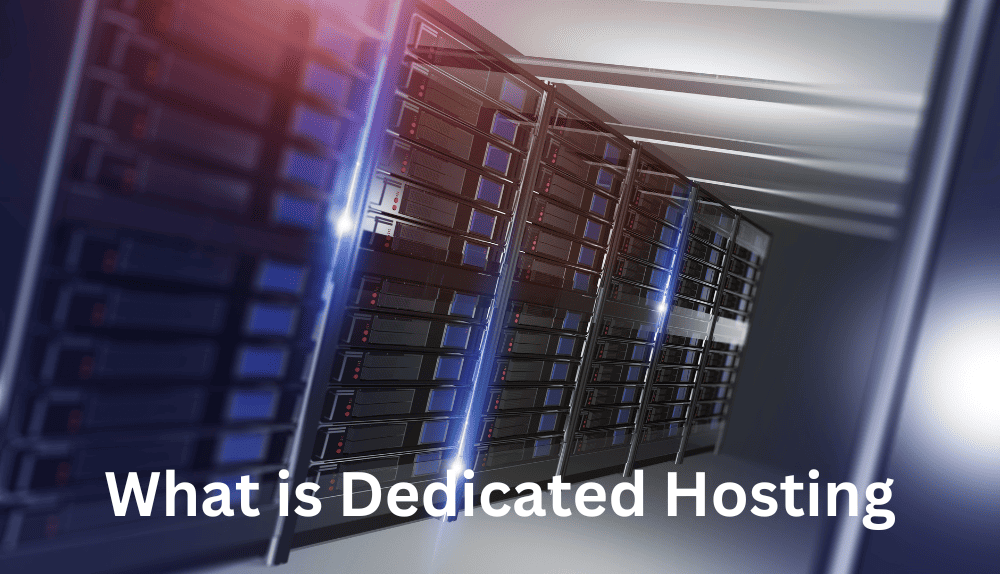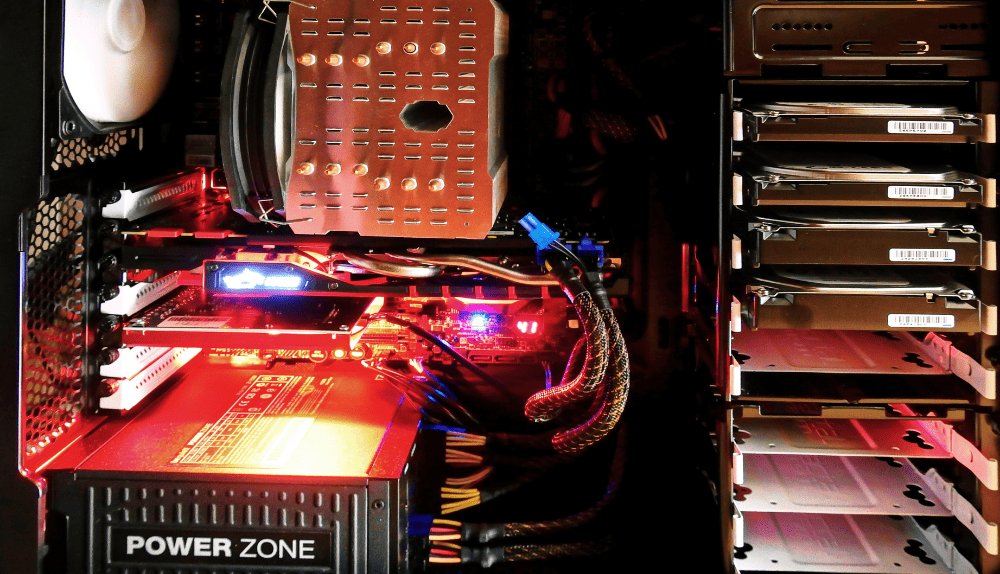- 19th Jun, 2023
- No Comments
What Is Dedicated Hosting?

Website hosting is an integral part of running a successful website. No matter how much you try to ignore it, eventually, it will come up sooner or later.
It has a big role to play in a website’s performance, whether it is speed, uptime, or scalability. Also, it ensures that your website remains accessible to visitors with minimal downtime, preventing potential loss of traffic and revenue. But the type of hosting itself also matters for what your website it.
There are many different kinds of web hosting, but in this blog, we will just discuss what is dedicated hosting. Let’s start with finding out what that is.
What is Dedicated Hosting?
In web hosting, dedicated hosting takes center stage. It’s a particular type of hosting where a whole physical server is allocated to a single customer.

That’s right – the entire server is exclusively dedicated to one customer, giving them the ultimate control and utilization of its resources. All the processing power, memory, storage, and bandwidth are in the hands of the customer. No sharing, no compromises.
It’s a hosting arrangement that guarantees maximum control and performance for those who demand nothing but the best.
In contrast to shared hosting or VPS (Virtual Private Server) hosting, where you have multiple websites sharing the resources of a single server, dedicated hosting takes things to a whole new level. It’s all about maximum performance, top-notch security, and ultimate flexibility.
If you have a website or application that experiences heavy traffic, needs some serious processing power, craves enhanced security measures, or desires customization options that shared environments just can’t provide, then dedicated hosting is the way to go.
With dedicated hosting, the customer has the freedom to configure the server according to their specific needs, install custom software, and have full control over server management tasks.
Additionally, dedicated hosting offers high reliability and uptime since the server’s resources are not shared with other users.
When is Dedicated Hosting Required?
Before jumping into dedicated hosting, it’s crucial to evaluate the specific requirements of your website, the expected levels of traffic, and your security needs. Take the time to reflect on the following scenarios, which indicate that a website might require dedicated hosting.
1. When Your Website Has High Traffic
When we talk about websites that attract massive amounts of traffic, dedicated hosting is a perfect choice. Dedicated hosting ensures top-notch performance and puts a stop to any server overload. With reliable resources in place, handling that surge of traffic becomes a breeze, leading to lightning-fast response times.
2. When You Have Resource-Intensive Applications
When we talk about applications that demand serious processing power, memory, or storage, we’re looking at the big things. Think complex databases, those sprawling e-commerce platforms that handle massive transactions, or those streaming services that keep us entertained for hours on end. All these powerhouses need dedicated hosting.
3. When Your Website Needs Enhanced Security
Security-wise, dedicated hosting takes it up a notch compared to shared hosting. If your website handles sensitive customer data, financial transactions, or confidential information, dedicated hosting steps in with top-notch security measures. Advanced firewalls, dedicated SSL certificates, and secure backups all work together to provide you with peace of mind and fortify your online presence.
4. When You are Looking for Full Customization and Control
If you need complete control over your server environment and the flexibility to customize server settings, software installations, and server configurations, dedicated hosting is the right choice. It allows you to tailor the server to your specific needs and preferences.
5. When You Have Compliance Requirements
Certain industries and regulatory frameworks may have specific compliance requirements for data handling, storage, and security. Dedicated hosting can ensure compliance with these regulations by providing a dedicated infrastructure that meets the necessary standards.
6. When You are Driven Towards Scalability and Growth
With dedicated hosting, you get that scalability factor. It’s like having a flexible framework that easily adjusts to your future growth. As your website or application starts booming and expanding, you can effortlessly level up your server resources or add extra servers to your dedicated hosting environment.
What are the Benefits of Dedicated Hosting?
Talking of demanding businesses, dedicated hosting brings many benefits to the table. It’s the kind of hosting that can truly meet their needs. Here are some benefits of dedicated hosting:
1. It is Cost-effective
Dedicated hosting might come with a higher price tag compared to shared hosting, but in the long haul, it’s a smart investment that can actually save you some serious cash. How? Because of its top-notch performance, reliability, and scalability.

2. It Provides Top-Notch Performance
With dedicated hosting, it’s like a special treatment. The server resources are all yours. Whether it’s one website or just a handful of them, you’re in for some incredible speed and faster loading times.
3. It is Compliant
If you find yourself working in industries like healthcare, banking, finance, or e-commerce, dedicated hosting might just be the answer you’re looking for.
4. It Allows Full Customization
In comparison to shared hosting, dedicated hosting takes the crown because of its unparalleled flexibility. It empowers you to tailor your hardware, software, and security precisely to match your unique needs and requirements.
5. It Provides Dedicated Support
Dedicated hosting companies take customer support to the next level. With dedicated hosting, you get exclusive support channels. These channels are staffed by knowledgeable agents who specialize in tackling all your dedicated hosting issues.
6. It is Reliable
Due to the fact that your server resources are not shared with any other websites or applications, which could potentially impact performance and lead to dreaded downtime, dedicated hosting ensures unparalleled reliability and uptime.
7. It is Secure
With dedicated hosting, there is no need to worry about security risks caused by co-tenants in shared hosting. One of the most significant advantages is the freedom to install your very own security software. You get to choose the security measures that suit your needs and preferences.
Are There Any Drawbacks of Dedicated Hosting?
Everything is not perfect and always has some drawbacks. The question is – whether less or high.
Well, in the case of dedicated hosting, the drawbacks are on the lesser side.
One of the drawbacks is the high cost. With dedicated hosting, you’re looking at a pretty penny compared to the more budget-friendly shared or cloud hosting options.
Why? Because you’re reserving yourself for exclusive access to a server. It’s like having your own private playground, but it comes at a price.
Another drawback is the issue of maintenance and updates. With dedicated hosting, you’re controlling everything, which means you’re responsible for keeping the server’s hardware and software updated.
And that is not a walk in the park. It can be time-consuming and demands a certain level of technical expertise. So, if you’re not up for the challenge or don’t have the necessary know-how, it can quickly become a headache.
How to Select a Dedicated Hosting Provider?
Picking the ultimate dedicated server hosting provider for your website can leave you feeling overwhelmed. With countless web hosting providers out there, it’s no wonder you’re facing a real challenge.
And let’s not forget about the pricing plans, products, and features. It’s like finding a needle in a haystack all by yourself. Seriously, it’s a daunting task.
To help you narrow down the choices and make an informed decision, follow these seven tips:
1. Look for Reliability and Uptime Guarantee
Make sure to take a good look at the provider’s uptime guarantee. It tells you the percentage of time their servers are expected to be up and running smoothly.
You should find providers that offer a solid uptime guarantee, ideally 99.9% or higher. It ensures your website experiences minimal downtime, keeping it up and running for your visitors without interruptions.
2. Check Server Performance and Resources
Ensure that the hosting provider offers high-performance servers with ample resources, including processing power, memory, storage, and bandwidth. Look for providers that use top-quality hardware and offer scalability options to accommodate future growth.
3. Go for Higher Security Measures
Evaluate firewalls, intrusion detection systems, DDoS protection, and data backups. These security protocols are absolutely vital while safeguarding your valuable data and ensuring the overall safety of your website and, of course, your users.
4. Look for High Network Connectivity and Speed
Look at their data center locations, network infrastructure, and peering arrangements. You want to find those providers who boast robust network connections and minimal latency, ensuring that your website enjoys lightning-fast and dependable access.
5. Evaluate Technical Support and Managed Services
Think about the level of technical support the hosting provider brings to the table. Do they offer round-the-clock customer support, live chat, or phone assistance? And if you’re all about managed hosting, make sure to ask about their managed services that take care of server administration, monitoring, and those annoying regular maintenance tasks.
6. Compare Pricing and Contracts
When you’re comparing the pricing structures of various providers, it’s crucial to take a close look at both the upfront costs and any ongoing fees. Make sure you read all the contract terms, renewal prices, and any sneaky additional charges that may pop up if you exceed resource limits. Be thorough in your assessment, as these factors can significantly impact your overall expenses.
7. Check for Reputation and Customer Reviews
Don’t forget to dig into the hosting provider’s reputation and delve into customer reviews and testimonials. Take a good look at what people are saying about their customer support, server reliability, and overall satisfaction. It’s these experiences of existing customers that will give you a real sense of what you can expect.
8. Are There Any Scalability and Upgrade Options?
Find out whether the hosting company provides scalability options or not. Having these options at your disposal will help you upgrade the server resources or add additional servers as your needs grow. Flexible upgrade options ensure that your hosting environment can accommodate future expansion without significant disruptions.
9. What’s the Data Center Location?
Take into consideration the location proximity of the data centers that the hosting company is providing. Selecting a data center location that is close to the website’s target visitors can help improve website performance and reduce latency.
Final Thoughts
If your website is having a tough time handling a surge in traffic, it might just be the perfect moment to migrate it to a dedicated server.
Picture this: a server solely dedicated to hosting your site.
Not only does it amp up your site’s performance, but it also turbocharges your page loading times and gives you the power to optimize security like never before.
FAQs
What is meant by dedicated hosting?
Dedicated hosting refers to a hosting environment where an entire physical server is dedicated solely to one customer. It offers exclusive access to server resources, providing high performance, security, and customization options.
What is the advantage of dedicated hosting?
The biggest advantage is the full control and exclusive use of server resources, resulting in improved performance, enhanced security, customization options, scalability, and the ability to handle high-traffic volumes and resource-intensive applications.
Who needs a dedicated server?
Websites or applications that have high traffic, resource-intensive demands, sensitive data, compliance requirements, and the need for customization, or those seeking optimal performance, security, and control can benefit from a dedicated server.
What are the advantages and disadvantages of shared hosting vs. dedicated hosting?
Shared hosting involves sharing server resources with multiple users, making it cost-effective but limited in performance and customization. Dedicated hosting provides exclusive resources, better performance, and customization options but is more expensive. The choice depends on specific needs and budget.
Is dedicated hosting faster than shared hosting?
Yes, dedicated hosting is generally faster than shared hosting. With dedicated hosting at your disposal, you can special access to server resources, eliminating the potential performance bottlenecks caused by sharing resources with other users in a shared hosting environment. This results in faster response times and better overall performance.
